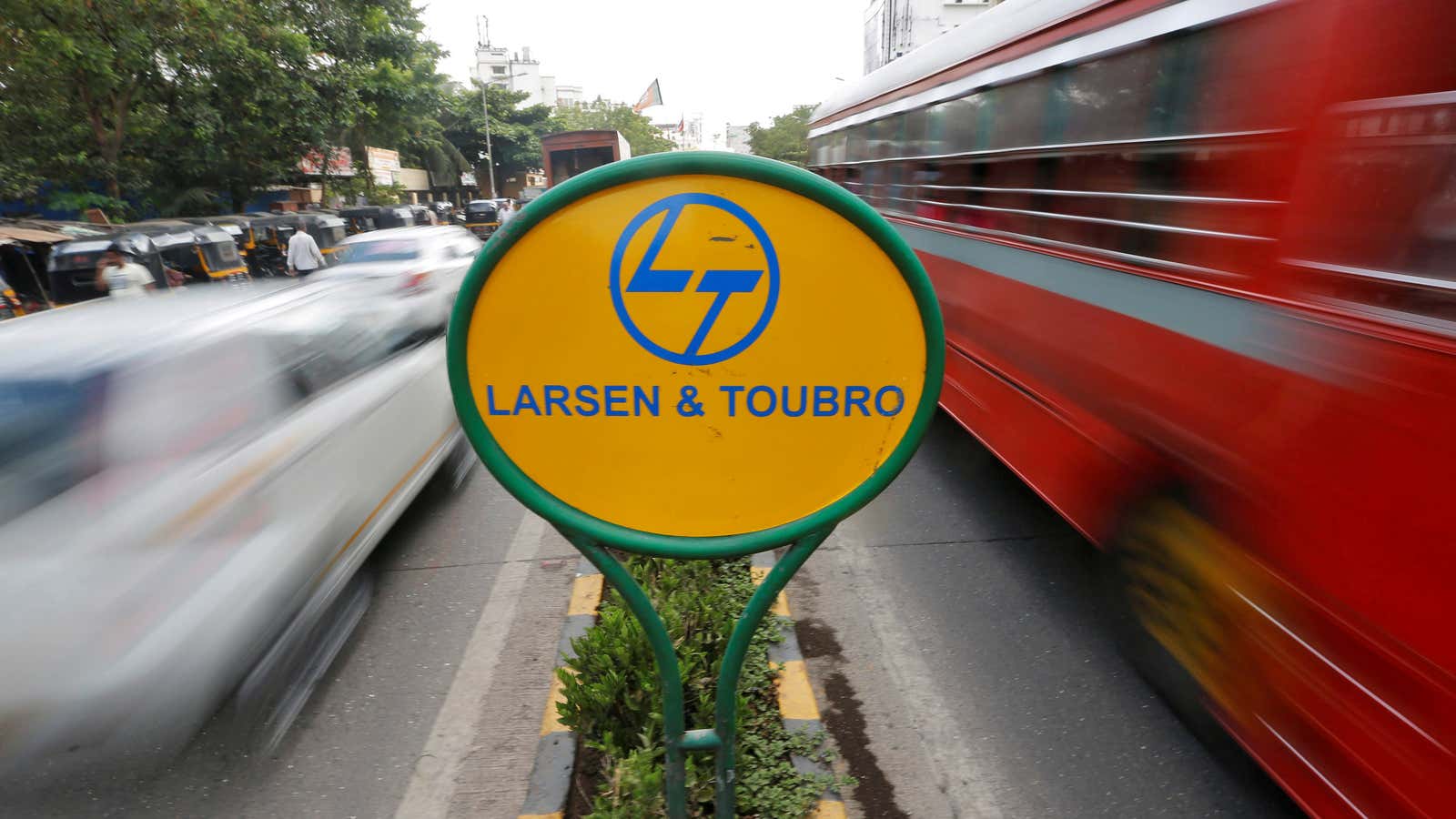The Indian IT outsourcing industry is witnessing an unusual event: a hostile takeover bid.
On March 19, Indian engineering behemoth Larsen & Toubro (L&T) signed a deal (pdf) to buy a 20.32% stake in IT outsourcing company Mindtree from VG Siddhartha, owner of the country’s largest coffee shop chain, Café Coffee Day (CCD). It also announced plans to acquire a controlling stake in Mindtree for close to Rs10,700 crore ($1.6 billion) through an open offer to public shareholders at Rs980 per share. On March 19, Mindtree’s shares closed at Rs943 apiece on BSE.
The announcement, however, came with way too many emotions for a business deal.
“We are trying to do this with pyaar (love) and will continue to look at this as something we are doing from our dil (heart),” S N Subrahmanyan, CEO and managing director of L&T said while announcing the transaction.
But his feelings seem pretty one-sided.
On the same day, Mindtree’s co-founders, CEO Rostow Ravanan, executive chairman Krishnakumar Natarajan, and former chairman Subroto Bagchi, called a separate press conference vehemently opposing a takeover by L&T.
“This is corporate India’s #MeToo moment,” Natarajan said, trying to highlight how a bigger player was arm twisting a smaller player.
While the jury is still out on how the drama will end, there’s enough already to make it a nail-biting tale of corporate twists and turns.
The coffee man & his money
For several months now, Mindtree’s been in the news over a likely churn of investors.
That’s because VG Siddhartha, the single largest shareholder in the Bengaluru-based tech firm, has reportedly been looking to pare the over Rs3,000 crore debt (as on March 31, 2018) of CCD.
Siddhartha was one of Mindtree’s first backers, picking up a 6.6% stake when it was founded in 1999. Over the years, he accumulated more shares in the company.
Post the deal with Siddhartha, L&T plans to buy a 15% stake in the company from the secondary market, over and above the 20.3% stake, which will ultimately trigger an open offer to all the shareholders for 31% additional stake. If the open offer is fully subscribed, L&T would control over 66% stake in Mindtree, something the IT company’s co-founders are averse to.
The Mindtree founders currently hold 13.32% stake in the company, while institutional investors such as Nalanda India Fund, Amansa Holdings, and Vanguard, among others, hold 50.57%.
Its board will meet today (March 20) to consider a buyback proposal for all paid-up equity shares to fend off a hostile takeover. The founders would need the approval of 75% of Mindtree’s shareholders to launch a buyback in order to block L&T’s hostile bid.
Meanwhile, Mindtree is a fairly prized asset for anyone. In the financial year ending March 2018, it posted consolidated revenue of nearly Rs5,463 crore and a net profit of over Rs570 crore. It has managed to grow despite a tough business environment, changing technology trends, and protectionism in the US, the largest market for Indian IT companies.
Most recently, for the quarter ending December 2018, Mindtree posted a 2.4% quarter-on-quarter increase in revenue, and projected a strong fourth quarter ending March, citing pick-up in its deal pipeline.
However, this takeover drama might prove damaging.
Events reached a crescendo on March 19 when, on the one hand, L&T announced its deal with Siddhartha and on the other, Mindtree co-founders made emotional appeals to other key shareholders to block the takeover.
“Customers and employees choose Mindtree not for its buildings, but for its culture, and a takeover by L&T could persuade many to move elsewhere,” Bagchi said.
The founders and their reasons
Mindtree’s promoters raised five—mostly sentimental and not business-related—objections:
- You have chosen to mount the first ever “hostile takeover” in the 50-year-old unblemished Indian IT industry. If you persist in what you are doing, you will be forever remembered for this. Is this how you want to set an example?
- You are a company with a turnover of Rs1,20,000 crore. You are 18 times our size. Why can’t you build a great technology business with all your resources and capability without decimating another organisation?
- Our customers choose us for our unique culture. They will stall all future business and even take their business elsewhere. In the process, you would have demolished shareholder value for both companies. Is this the right thing to do?
- This is a people’s business. Our people have signed up for a mission and not just a salary. Take their mission away and they will go. What would you be left with?
- If companies like you behave with extreme hostility to first generation entrepreneurs, what message are you giving to all startups in the country?
Meanwhile, Bagchi, former chairman, told the media that the co-founders were offered “huge bags of money” but they refused to sell Mindtree: “Mindtree has become a global brand. Twenty-thousand Mindtree (employees) are working relentlessly to get past a $1-billion milestone just as I speak to you today. But sadly, as we have remained focused on the institution-building process, we have also drawn the attention of people who really don’t care about all this. Suddenly, Mindtree has become an ‘attractive asset’ that they must have.”
But experts say the emotional appeals might be too little too late.
“The Mindtree management has acted too late. The moment Siddhartha stepped down from the board (in December 2018), it was expected that he will sell the stake,” an IT analyst told Quartz requesting anonymity. “…the promoters should have identified the red signal if they are opposed to selling.”
